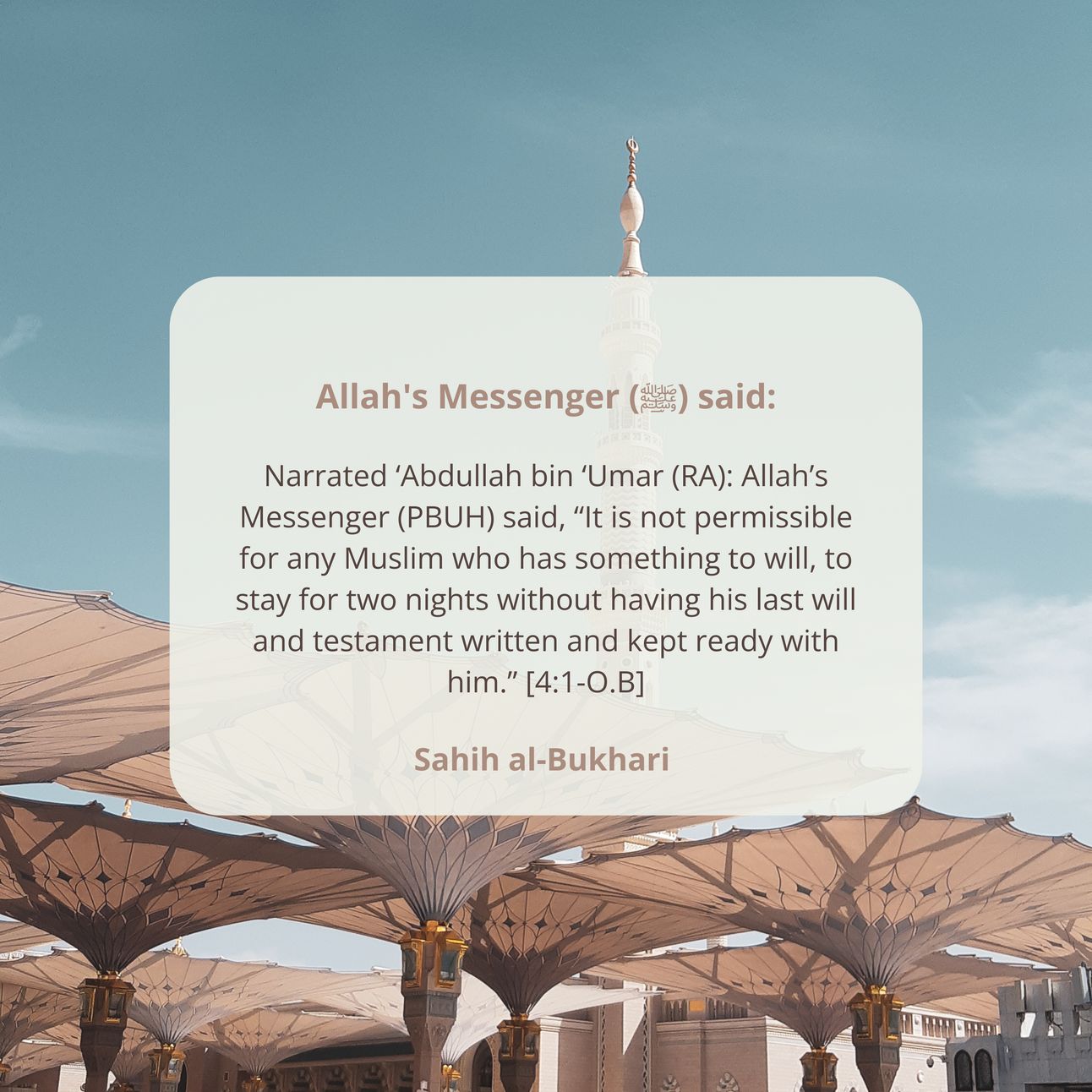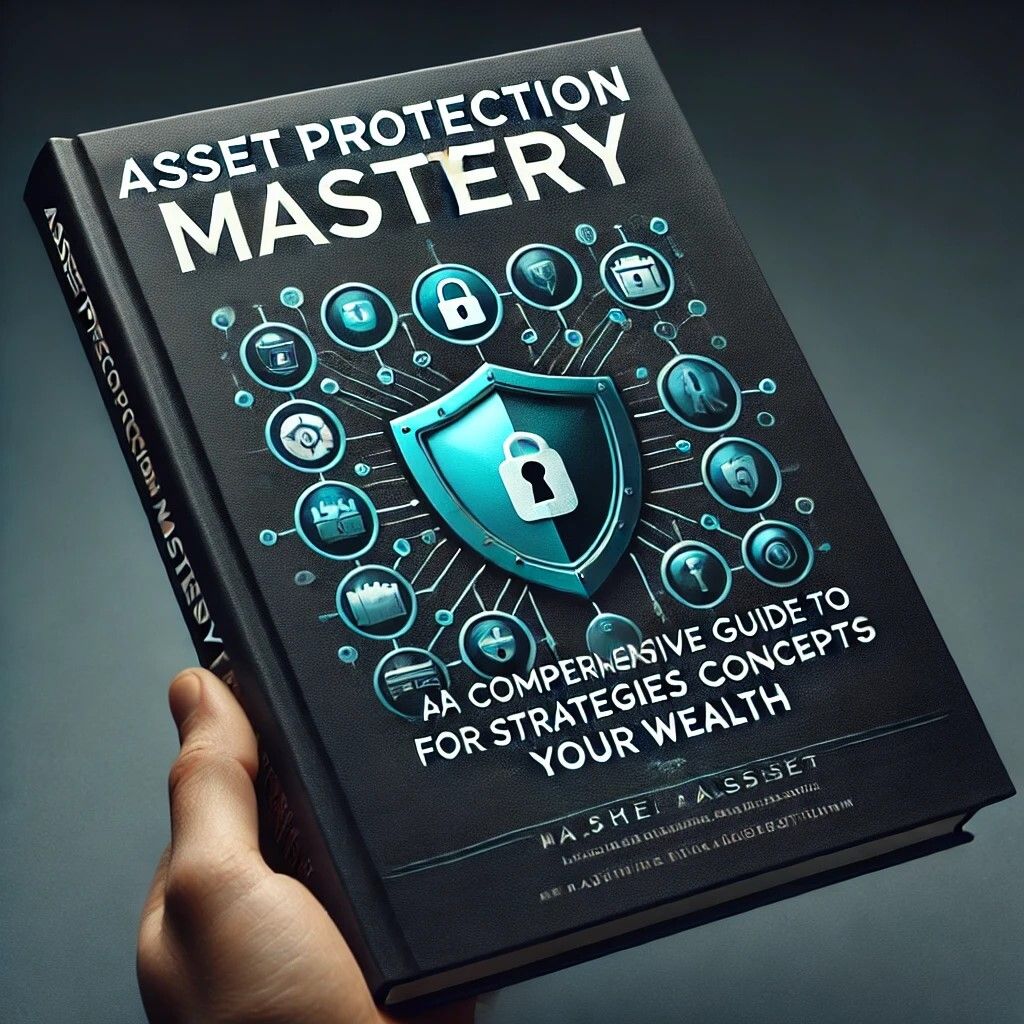- Halal Legacy Shield
- Posts
- Secure Your Legacy: The Crucial Role of Islamic Wills in Protecting Your Family and Faith
Secure Your Legacy: The Crucial Role of Islamic Wills in Protecting Your Family and Faith

Secure Your Legacy: The Crucial Role of Islamic Wills in Protecting Your Family and Faith
Assalamu Alaikum
We hope this email finds you in the best of health and Imaan.
At Halal Legacy Shield, we understand the profound importance of Islamic estate planning. Ensuring that your wealth and legacy are in full compliance with Shariah law is not only a responsibility but also a means to attain peace of mind for you and your loved ones. For a limited time, we are offering a 10% discount on all our Islamic estate planning services. to the first 10 people who book consultation This exclusive offer is our way of supporting you in taking the crucial step towards securing your family's financial future in accordance with Islamic principles.
Islamic teachings emphasize the importance of preparing a will, known as wasiyyah, to ensure the responsible distribution of one’s estate according to Islamic principles. This preparation is not just a legal formality but a fundamental aspect of Islamic ethics and duty. Here’s a comprehensive overview of why writing a will is essential, supported by Quranic guidance, Hadith, and practical considerations.
TODAYS EMIL
Quranic Guidance on Wills
Sunnah: Hadith on the Importance of Wills
The Crucial Role of Asset Protection (Strategy)
Facts about Islam

Surah Baqarah (Chapter 2) of the Quran addresses many aspects of life, including inheritance laws. The verses leading up to 2:180 provide detailed instructions on how inheritance should be distributed among family members, ensuring that each heir receives their rightful share. This system is designed to uphold justice and equity.
Verse 2:180 "It is prescribed for you, when death approaches any of you, if he leaves wealth, that he makes a bequest to parents and next of kin, according to reasonable usage; this is due from the Allah-fearing." (Quran 2:180)
Explanation
Obligation to Write a Will
The verse underscores the duty of making a bequest (wasiyyah) when nearing death. This act involves specifying how one's estate should be managed and distributed, ensuring adherence to Islamic guidelines.
Writing a will is a religious obligation for Muslims with wealth, facilitating the fulfillment of their wishes and compliance with Islamic law.
A bequest to Parents and Kin
The verse specifically highlights the importance of making provisions for parents and next of kin, reflecting the significance of supporting immediate family members.
The term "reasonable usage" implies that the bequest should be fair and balanced, avoiding any undue burden on the heirs.
Importance of Fearing Allah
The phrase "this is due from the Allah-fearing" emphasizes that responsible estate management is an aspect of piety. It highlights the ethical and moral responsibility of managing one’s affairs with fairness and justice.
Practical Implications
Preventing Disputes
A well-drafted will helps prevent disputes among family members by providing clear instructions on asset distribution, thus minimizing confusion and potential disagreements.
Ensuring Fairness
Writing a will ensures that assets are distributed according to the individual's wishes and Islamic principles, reinforcing fairness and equity.
Islamic Estate Planning
The guidance in this verse is crucial for Islamic estate planning, facilitating a smooth transfer of wealth while respecting the rights of all family members.
Sunnah: Hadith on the Importance of Wills

Hadith Reference Abdullah ibn Omar (RA) reported that the Prophet Muhammad (PBUH) said: "It is not right for a Muslim who has something valuable to stay for two nights without having his will written and kept ready with him." (Sahih Bukhari, Book 23, Hadith 1)
Explanation
Urgency of Writing a Will
The Hadith highlights the urgency of preparing a will for Muslims with valuable possessions. It stresses that delaying this task is improper and neglectful.
The instruction to address this within "two nights" underscores the importance of promptly organizing one’s affairs.
Importance of Preparing a Will
A will outlines the distribution of wealth and ensures that the deceased’s intentions are followed, facilitating the fair and just handling of their estate.
Preventing Disputes and Confusion
By specifying how assets should be divided, a will prevents potential conflicts among heirs and provides clear guidance for managing the estate.
Ethical and Moral Responsibility
The Hadith reflects Islamic values of fairness, justice, and accountability, emphasizing that preparing a will is part of fulfilling one's duties and responsibilities.
Practical Implications
Legal and Social Considerations
In modern contexts, a will is both a religious and practical necessity, ensuring that estate management complies with Islamic law and secular regulations.
Peace of Mind
Preparing a will provides peace of mind, knowing that one's affairs are in order and that family members will be taken care of according to Islamic principles.
Legacy of Responsibility
Following this Hadith helps leave a legacy of responsibility and care, reflecting a commitment to handling one’s estate with integrity and respect for Islamic values.
Real-Life Implications
Several cases illustrate the critical need for proper estate planning:
A Muslim brother in Canada died without a will, leaving his non-Muslim wife unaware of Islamic burial rites, resulting in a non-Islamic funeral.
A Muslim couple’s death left their children in state foster care, eventually adopted by a non-Muslim family.
A Muslim in Annapolis had his body cremated due to his non-Muslim family's decision.
A young Muslim’s non-Muslim mother prevented an Islamic burial, causing distress for his father.
These examples highlight the complications that arise when a will is not in place. Proper Islamic estate planning could have resolved these issues, ensuring adherence to Islamic practices and protecting the rights of the deceased and their heirs.
Verse 2:180 of Surah Baqarah and the Hadith on writing a will emphasize the vital role of estate planning in Islam. They stress the importance of preparing a will to ensure the fair and responsible distribution of assets, prevent disputes, and uphold Islamic principles. By addressing these issues proactively, Muslims can secure their legacy and protect their families, fulfilling their religious obligations and ensuring a just and ethical transition of wealth.
Safeguarding Your Future: The Crucial Role of Asset Protection

In the fast-paced world we live in, asset protection is a critical yet often neglected aspect of financial planning. Waiting until it's too late can have devastating consequences. Asset protection is a proactive approach that involves employing legal and financial measures to protect your assets from threats such as lawsuits, creditors, and unexpected financial hardships. It's about securing your hard-earned wealth and ensuring financial stability for yourself and future generations.
Why Asset Protection is Essential
Lawsuits: In our litigious society, anyone can file a lawsuit against you for any reason. Even unfounded claims can result in costly and time-consuming legal battles.
Creditors: Unexpected events like business failures or medical emergencies can lead to significant debt, making you vulnerable to creditor claims.
Divorce: The division of assets in a divorce can be complex and often leads to substantial financial losses.
Estate Planning: Protecting assets for your heirs is a vital part of estate planning. Asset protection ensures that your legacy remains intact.
Key Asset Protection Strategies
Limited Liability Entities (LLCs, Corporations): These legal structures segregate personal and business assets, thereby limiting liability in case of lawsuits or financial difficulties.
Asset Trusts: Trusts can hold assets for beneficiaries, offering an additional layer of protection from creditors and lawsuits.
Insurance: Comprehensive liability insurance is essential to cover potential damages from accidents or legal claims.
Asset Titling: The way assets are titled can affect their vulnerability. Different forms of ownership, such as joint ownership, tenancy in common, and tenancy by the entirety, have varying implications.
Prepaid Expenses: Converting assets into prepaid expenses for items like insurance or taxes can make them less appealing to creditors.
Offshore Asset Protection: Although complex, offshore asset protection can offer significant advantages for high-net-worth individuals.
Real-Life Scenarios
The Business Owner: Imagine a small business owner who faces a costly lawsuit from an unhappy customer. Without proper asset protection, the owner might have to forfeit personal assets to settle the judgment.
The High-Net-Worth Individual: A successful entrepreneur accumulates substantial wealth but remains concerned about potential lawsuits stemming from business dealings. Asset protection strategies help safeguard their assets for themselves and their family.
The Retiree: A retired couple with significant savings can use asset protection to ensure their retirement funds are secure from long-term care expenses or potential inheritance disputes.
Common Misconceptions About Asset Protection
It's Only for the Wealthy: Asset protection is beneficial for individuals at all income levels.
It's Fraudulent: When executed correctly, asset protection is both legal and ethical.
It's Too Complicated: Although it requires professional guidance, asset protection plans can be customized to fit individual needs.
Asset protection isn't about hiding assets or shirking responsibilities; it's about building a financial fortress to shield your wealth from unforeseen circumstances. By recognizing the risks and implementing effective strategies, you can achieve peace of mind and secure your financial future.
Islam: An Eternal Faith Rooted in Monotheism
Islam is not a religion that began with the Prophet Muhammad (PBUH) in 632 CE; rather, it is a timeless faith that stretches back to the dawn of humanity. According to the Quran, Islam's essence began with Prophet Adam (AS) and continued through a lineage of revered prophets, including Ibrahim (AS), Musa (AS), and Isa (AS). These prophets, along with the 25 named in the Quran and over 125,000 unnamed messengers of Allah, collectively represent the enduring message of monotheism.
Prophet Musa (AS) is mentioned more than 60 times in the Quran, and Prophet Isa (AS) is referenced 25 times, each with the highest respect and honor. This extensive acknowledgment highlights the profound impact and universal nature of their messages. Over time, many of these significant figures from other faith traditions may have been elevated to divine status, yet their core teachings align with the Islamic concept of the Oneness of Allah—the central belief in a singular, all-powerful Creator.
Islam's embrace of monotheism makes it a faith that is deeply inclusive. It acknowledges and respects the shared values and beliefs of Judaism, Christianity, and other monotheistic religions. By recognizing the unity of God and the shared heritage of divine messages, Islam stands as a testament to the universality of faith and the enduring connection between all believers in the Oneness of Allah.
Don't wait until it's too late to safeguard your hard-earned wealth. The time to act is now! By consulting with asset protection professionals, you can create a robust plan tailored to your unique needs, ensuring financial security for you and your loved ones.
Here's how to get started:
Schedule a Free Consultation: Speak with one of our expert advisors to assess your current situation and identify potential risks. Our team will help you develop a personalized asset protection strategy.
Download Our Comprehensive Asset Protection Guide: Get instant access to valuable insights and practical tips on protecting your assets. This guide will walk you through the essential steps you need to take.
Why Act Now?
Prevent Future Losses: Shield your assets from lawsuits, creditors, and unforeseen financial challenges.
Secure Your Legacy: Ensure that your wealth is preserved for future generations.
Gain Peace of Mind: Rest easy knowing that your financial future is protected.
Take the Next Step: Click the button below to schedule your free consultation or download our guide. Your financial security is too important to delay!
Why Islamic Estate Planning Matters:
Islamic estate planning is essential for:
Preserving Your Legacy: Ensuring your wealth is distributed according to Islamic principles.
Protecting Your Loved Ones: Providing security and clarity for your family’s future.
Fulfilling Religious Obligations: Complying with Shariah law in all aspects of your estate.
Our Unique Approach:
Halal Legacy Shield is dedicated to offering comprehensive estate planning services that respect and uphold Islamic values. Our approach includes:
Wills & Trusts: Drafting documents that reflect your wishes and comply with Islamic laws.
Asset Protection: Ensuring your assets are safeguarded and distributed correctly.
Healthcare Directives: Establishing advance directives that respect your religious beliefs.
Tax Planning: Structuring your estate to minimize tax liabilities while complying with Shariah law.
Exclusive Offer – Act Now!
For a limited time, we are offering a 10% discount on all our Islamic estate planning services. This exclusive offer is our way of supporting you in taking the crucial step towards securing your family's financial future in accordance with Islamic principles.
Benefits You Will Receive:
Personalized Consultation: One-on-one consultation with our expert advisors.
Comprehensive Planning: Custom solutions tailored to your unique needs.
Continuous Support: Ongoing guidance and updates to your estate plan as needed.
Peace of Mind: Assurance that your legacy is preserved in line with Shariah law.
Hurry – Offer Ends Soon!
Don't miss out on this exclusive opportunity. This limited-time offer is available only until August 22 2024 . Make sure to book your appointment now to take advantage of the 10% discount and secure your family's future.
Take Action Today:
💻 Visit Our Website: www.islamicwillstrust.com
📞 Call Us: 1855-559-4557
📧 Email Us: [email protected]
May Allah (SWT) bless you with peace and prosperity, and may your legacy continue to benefit your loved ones and the Ummah.
Warm Regards,
The Halal Legacy Shield Team
Disclaimer
This article is intended to provide general information and should not be construed as legal or financial advice. Consult with professionals to evaluate your specific needs and develop a personalized asset protection plan.

Reply